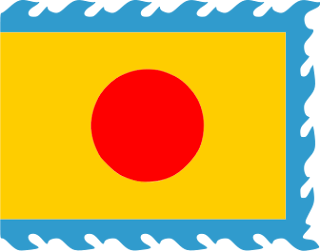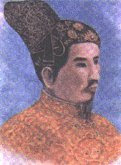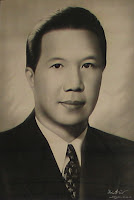Sunday Deposed Monarch Blogging: Nguyen Dynasty
 In 1777 a peasant rebellion resulted in the massacre of the family of Nguyen Phuc Anh, son of feudal nobility in what is now southern Vietnam. The fifteen year old escaped, and returned to his home after the peasant army left to move north. Nguyen Phuc Anh gathered his troops and found important supporters, including a major admiral, and managed eventually to defeat the Tay Son forces in a war that lasted almost twenty years. Nguyen Phuc Anh asked for and received support from France, which helped him unify Vietnam in 1802. He took the name Gia Long and declared himself Emperor of Vietnam at Hue. Gia Long’s twenty-year reign saw much modernization, often with the assistance of the French, but also involved retrenchment and consolidation by conservative elements in Vietnamese society.
In 1777 a peasant rebellion resulted in the massacre of the family of Nguyen Phuc Anh, son of feudal nobility in what is now southern Vietnam. The fifteen year old escaped, and returned to his home after the peasant army left to move north. Nguyen Phuc Anh gathered his troops and found important supporters, including a major admiral, and managed eventually to defeat the Tay Son forces in a war that lasted almost twenty years. Nguyen Phuc Anh asked for and received support from France, which helped him unify Vietnam in 1802. He took the name Gia Long and declared himself Emperor of Vietnam at Hue. Gia Long’s twenty-year reign saw much modernization, often with the assistance of the French, but also involved retrenchment and consolidation by conservative elements in Vietnamese society.
 French influence steadily grew through the 19th century, and by 1874 France achieved full territorial control of Indochina (Vietnam plus Laos and Cambodia). This control was not without some difficulty; Vietnam has a strong tradition of resistance to foreign invaders, and in many quarters the French were understood to be the successors of the Chinese. Nevertheless, the Vietnamese elite became increasingly attached to French culture and the French colonial system. The Nguyen family suffered various regicides, depositions, and early exiles, and in general lost considerable popular support. By the 20th century, the monarch was seen as little more than a French puppet.
French influence steadily grew through the 19th century, and by 1874 France achieved full territorial control of Indochina (Vietnam plus Laos and Cambodia). This control was not without some difficulty; Vietnam has a strong tradition of resistance to foreign invaders, and in many quarters the French were understood to be the successors of the Chinese. Nevertheless, the Vietnamese elite became increasingly attached to French culture and the French colonial system. The Nguyen family suffered various regicides, depositions, and early exiles, and in general lost considerable popular support. By the 20th century, the monarch was seen as little more than a French puppet.
Bao Dai became King of Annam upon the death of his father in 1926. His stay in Vietnam was brief, as he almost immediately returned to France to resume his education. Bao Dai made a habit of periodically visiting his kingdom, and was in Vietnam when the Japanese assumed control of French Indochina in 1941. By 1945, however, the utility of the Vichy authorities had come to its end, and the Japanese coerced the Bao Dai into declaring independence for Vietnam, with himself as Emperor. His empire only lasted a few months, however, as the Communist forces of Ho Chi Minh successfully encouraged the Emperor to abdicate in August 1945. Bao Dai remained briefly in Vietnam before leaving for China and Hong Kong. The French persuaded him to return and occupy the position of head of state in 1949, but he soon proved a threat to Ngo Dinh Diem, and left again for France in 1950. In 1955, Diem officially turned Vietnam into a republic.
 Bao Dai displayed little more interest in Vietnam after his exile than he had during his brief reign. Apart from a few statements in 1972 about reconciliation and some contacts with the Vietnamese exile community in the United States, he did not participate in Vietnamese politics. He lived most of the rest of his life in France. In 1997 Bao Dai died and was succeeded by his brother Bao Long, who apart from ten years distinguished service in the French Foreign Legion had a very similar career. Bao Long died in July of this year, and was succeeded by his brother Bao Thang, who has lived most of his sixty-four years in France.
Bao Dai displayed little more interest in Vietnam after his exile than he had during his brief reign. Apart from a few statements in 1972 about reconciliation and some contacts with the Vietnamese exile community in the United States, he did not participate in Vietnamese politics. He lived most of the rest of his life in France. In 1997 Bao Dai died and was succeeded by his brother Bao Long, who apart from ten years distinguished service in the French Foreign Legion had a very similar career. Bao Long died in July of this year, and was succeeded by his brother Bao Thang, who has lived most of his sixty-four years in France.
Prospects for a return to the throne are exceedingly unlikely. The dynasty does not appear to be particularly popular even among opponents of the current Vietnamese regime. One major exile group supports restoration of a constitutional monarchy, but its connections with the royal family are sketchy, and its activities were disavowed by Bao Long.
Trivia: The last reigning monarch of what dynasty sold his Kingdom to the British in return for a large pension?


